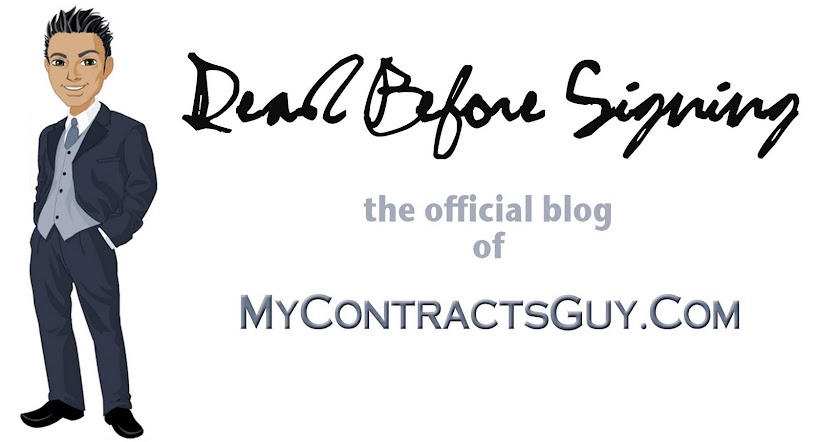 You would be amazed how many times I get asked this question. In fact, I would hazard a guess and say it's the question I get asked most often as an attorney. And the answer to this question is always yes. That's right - always. That was one of those things that our founding fathers insisted on: public access to the courts. So, yes, you can always sue someone and someone can always sue you. The real questions are: can you win a suit against someone, and more importantly, is it worth it?
You would be amazed how many times I get asked this question. In fact, I would hazard a guess and say it's the question I get asked most often as an attorney. And the answer to this question is always yes. That's right - always. That was one of those things that our founding fathers insisted on: public access to the courts. So, yes, you can always sue someone and someone can always sue you. The real questions are: can you win a suit against someone, and more importantly, is it worth it?Is it worth it?
The first thing you should know about lawsuits - or as lawyers like to call it, litigation - is expensive. And by "expensive" I mean, you cannot afford it. You can easily spend $100K-$250K on a business litigation matter before you even get to the courtroom. And that's using a mid-sized law firm. How good does your $10,000 claim look now?
And I know what you're thinking: well, I can get legal fees as part of my award. Except that it's usually not true. Only certain laws allow for the award of legal fees, and even when they do, your opponent's misconduct has to rise to a level high enough to be tantamount to accusing an innocent man of murder. Chances are you won't be getting legal fees in your award - which means it's coming out of your winnings if you win, and out of your pocket (in addition to the judgment you lost) if you don't. Well what about contingency fees? Well, you might be able to find an attorney who is willing to take your matter on "contingency" - meaning that they take a percentage of the court award rather than taking hourly fees. Sounds great, huh? Well it is, provided that you are looking for enough damages to make it worth their while - and for most decent attorneys who even take contingency, this number starts at $1,000,000.
But it's not all gloom and doom - there's still Small Claims Court. And in California the current limit for small claims is $7,500. If someone's taken you for that or less - it may very well be worth your time to file a small claims action. There you won't need an attorney, and are likely to get a default judgment (if the other party doesn't show up). The California Self-Help Legal Center for Small Claims is an excellent website, with forms, FAQs, and links that make the whole thing a lot easier - they even have information on collecting your judgment, which can often be the most difficult and daunting part of the process.
The bottom line answer to this question is: usually not. Litigation should be used (1) only as a last resort, and (2) only when there is a significant loss (e.g. six figures). Otherwise, you're best exploring other options. Most lawyers can still be a great resource for alternative dispute resolution. Chances are, they've seen their share of matters resolved before getting to court or even to litigation, and they have insights and ideas that you've likely never even thought of. What's more, most of them will give you these suggestions without charging you a penny.
Can you win it?
Well, I know you think you've got a "slam dunk", "can't lose" case. But, in reality, you probably don't. Here's the first thing you can throw out when considering your case: "fairness". If the majority of your legal opinion on a matter consists of "it's not fair" - you're wasting your time. There is no unwritten fairness code which dominates the practice of law - just like the lawyers and legal matters you see on TV. There are only rules and interpretations of those rules. That's it.
There are many things to consider when you evaluate whether or not you can win your lawsuit, a few of which include:
- The quality of your evidence: do you have it writing? how much of it?
- The quality of your opponent's evidence: what do they have in writing?
- Are there demonstrable damages? You've got to have more than hurt feelings.
- Does the misconduct rise to the appropriate level? If the law requires that someone have intent, you'll have to prove their state of mind
- How will it play out with a jury? Are you a sympathetic plaintiff? Are you suing a sympathetic defendant?
- Do you have enough resources to stick it out if the trial bogs down? As above, this stuff is expensive and cases rarely go exactly as planned.
Read this carefully: Litigation is always risky. No matter how good your case is, no matter how much you spend, no matter how much the judge/jury likes you, you can still lose. So if you're looking for guarantees, buy a vacuum cleaner from Sears and stay out of the courtroom.
Often times the best advice I give to clients involves how to avoid litigation rather than how to win it. Talking to a lawyer can often help you answer some of the questions and inform you regarding some of the realities of lawsuits. At the very least, your decision will be an informed one. After all, when it comes to suing, it's not whether you win or lose, but how much you pay in the game.




0 comments:
Post a Comment